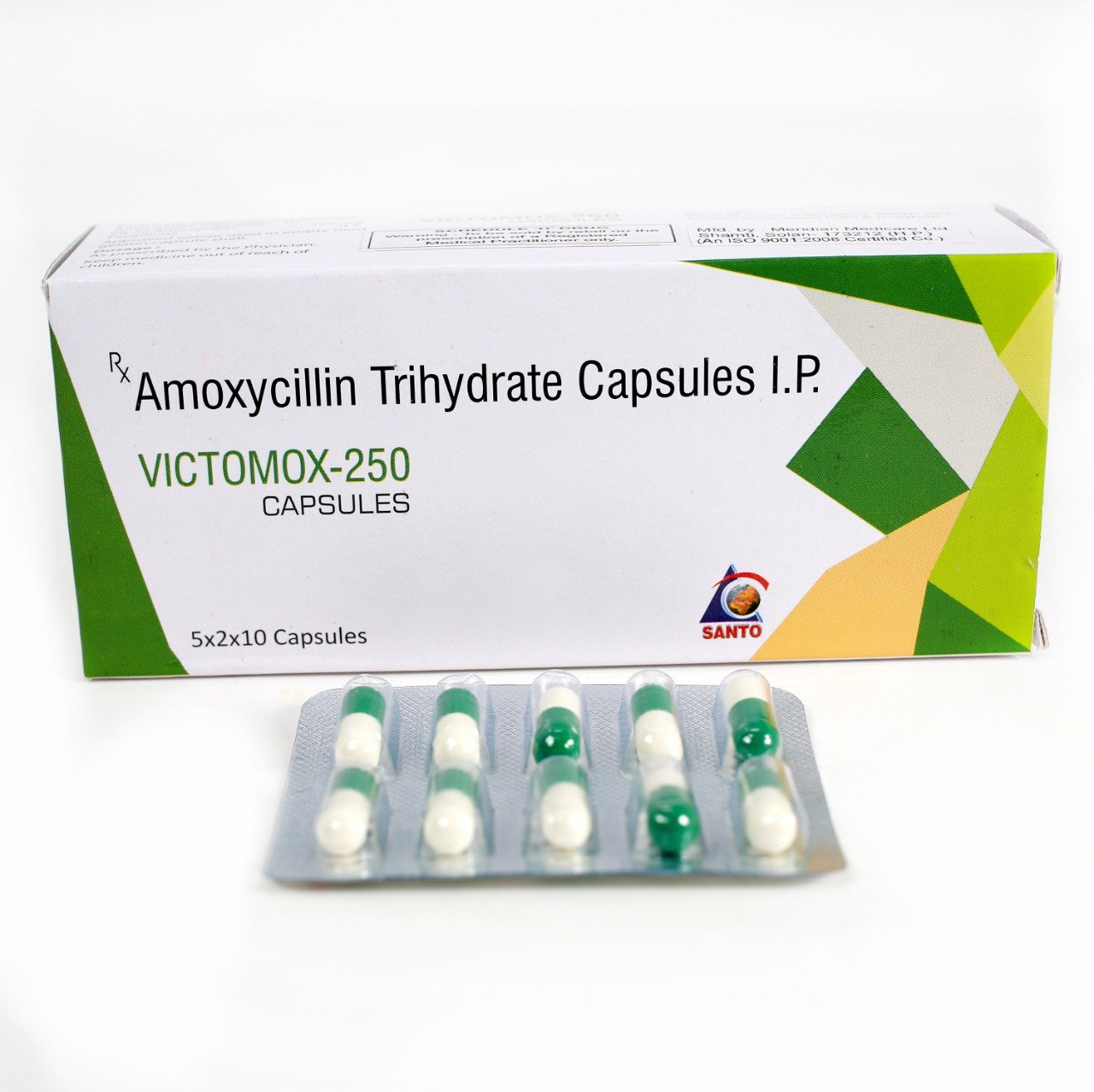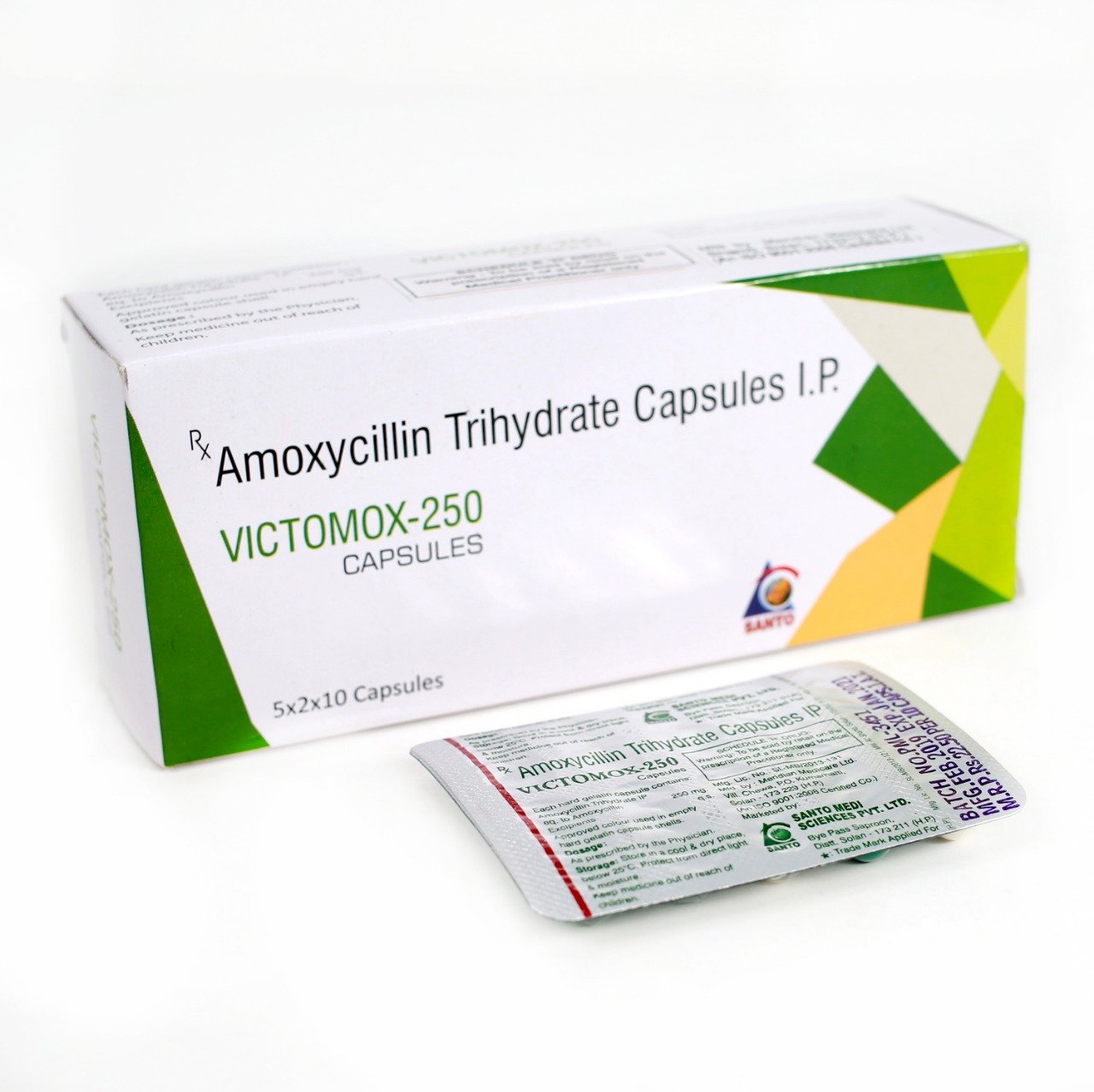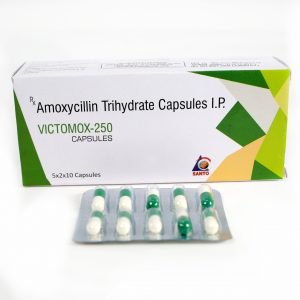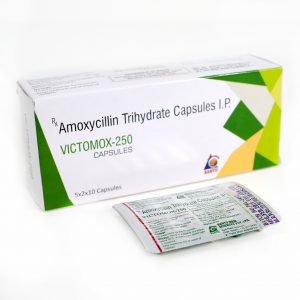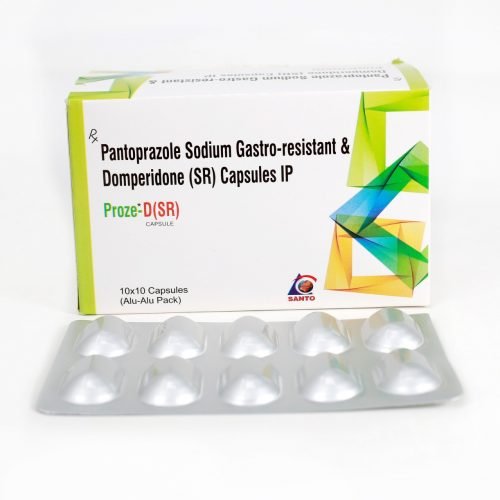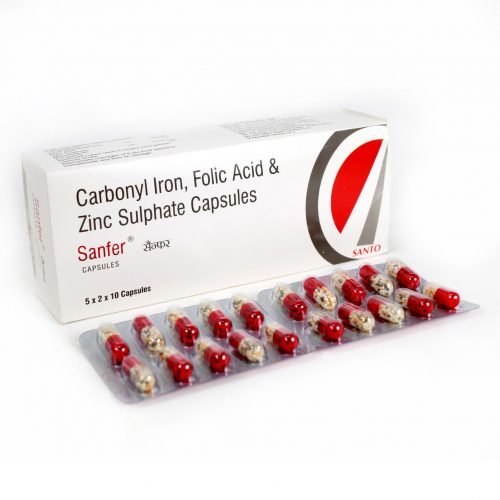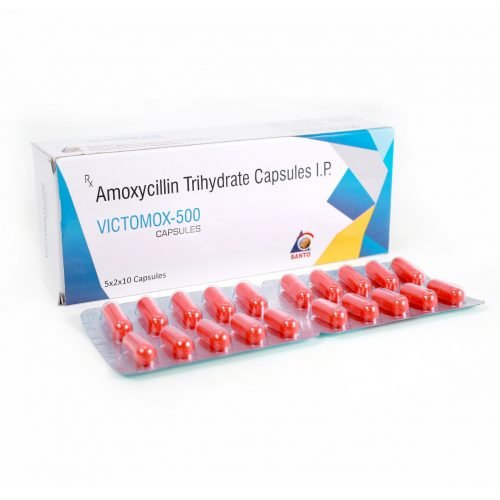- 01792-220191, 09839141955, 06390845955
- SCO No. 2 & 3, Block-B;Office No.-249A; 2nd Floor, Motia Plaza Baddi-173205; Distt. Solan (H.P.)
VICTOMOX-250
| Brad Name | Victomox-250 |
| Composition | Amoxycillin 250 mg Capsules |
Amoxycillin 250 mg Capsules
Amoxicillin is the generic form of the brand-name drug Amoxil, a drug used to treat bacterial infections.
Doctors prescribe amoxicillin to treat infections caused by bacteria that are sensitive to the drug, including E. coli, staphylococcus, streptococcus, H. influenzae, and H. pylori. Your doctor may prescribe amoxicillin to treat infections of the skin, throat, ears, nose, stomach, lungs, and urinary tract infections (UTI). However, the drug will not work against infections caused by viruses such as cold and flu.
Also, guidelines urge doctors to prescribe amoxicillin only when an infection is strongly suspected to be caused by bacteria. The Food and Drug Administration (FDA) first approved amoxicillin in the 1980s. Today, different drug companies produce this antibiotic: Brand names include Amoxil and Moxatag.
Dosage
Typical Dosages of Amoxicillin
Your dose of amoxicillin will depend on how severe your infection is and what type of infection you have.
Doctors determine children’s doses based on the type of infection and the child’s weight.
Amoxicillin comes in both capsules and tablets. Adults should take tablets or capsules whole with a glass of water.
Children’s amoxicillin comes in chewable tablets and liquid form.
You can take amoxicillin with or without food.
A common dose of amoxicillin for an adult with a mild to moderate ear, nose, or throat infection is 500 mg every 12 hours or 250 mg every 8 hours until the prescription is finished.
For a more severe infection, a common dose of amoxicillin is 875 mg every 12 hours or 500 mg every 8 hours.
A common dose of amoxicillin for a child (older than 3 months) with a lower respiratory tract infection is 40 mg per kilogram (kg) of weight per day in divided doses every 8 hours.
Or, doctors sometimes want the child to take 45 mg per kg per day in divided doses every 12 hours.
Amoxicillin Overdose
Though rare, it’s possible to take an overdose of amoxicillin.
If you or someone else takes too much medicine, call your local poison control center at 1-800-222-1222.
If the person collapses, stops breathing, or has any severe symptoms after an overdose, call 9-1-1.
Missed Dose of Amoxicillin
Take amoxicillin exactly as directed by your doctor.
Do not stop taking amoxicillin on your own. Skipping doses or stopping too soon can make your infection harder to treat.
If you miss a dose of amoxicillin, take the missed dose as soon as you remember.
If it’s almost time for your next dose, skip the missed dose.
Do not double your dose to make up for the missed dose.
Precautions
- Before taking amoxicillin, tell your doctor or pharmacist if you are allergic to it; or to penicillin or cephalosporin antibiotics; or if you have any other allergies. This product may contain inactive ingredients, which can cause allergic reactions or other problems. Talk to your pharmacist for more details.
- Before using this medication, tell your doctor or pharmacist your medical history, especially of: kidney disease, a certain type of viral infection (infectious mononucleosis).
- Amoxicillin may cause live bacterial vaccines (such as typhoid vaccine) to not work as well. Do not have any immunizations/vaccinations while using this medication unless your doctor tells you to.
- Before having surgery, tell your doctor or dentist about all the products you use (including prescription drugs, nonprescription drugs, and herbal products).
Side effects
Common side effects of amoxicillin include:
- Upset stomach
- Diarrhea
- Vomiting
- Yeast infection
Serious side effects of amoxicillin can also occur.
If you have any of these side effects, stop taking amoxicillin and call your doctor right away:
- Severe rash
- Yellowing of the skin or eyes (jaundice)
- Unusual bleeding or bruising
- Hives
- Seizure
- Excessive tiredness
- Swelling of the face, lips, or tongue
- Chest pain
- Difficulty breathing
- A peeling or blistering rash
- Severe or bloody diarrhea
Drug interaction
Some drugs may affect the way amoxicillin works, and amoxicillin may affect other drugs you are taking, causing problems.
It’s very important to let your doctor know about all drugs you are taking, including any over-the-counter (OTC) vitamins, herbs, or supplements.
Amoxicillin may make certain types of birth control pills less effective.
Drugs known to interact with amoxicillin include:
- A drug called allopurinol (Lopurin, Zyloprim), used to treat gout, high levels of uric acid in the body, and kidney stones
- Another drug used to treat gout, called probenecid (Benemid)
- Other antibiotics, including chloramphenicol, sulfonamides, macrolides, and tetracycline
If you are a diabetic and you test your urine for sugar, you should know that taking amoxicillin can affect some urine tests. Ask your doctor about urine testing while on amoxicillin.
Amoxicillin and Alcohol
Drinking alcohol while taking amoxicillin is generally considered safe, and it won’t decrease the effectiveness of amoxicillin.
However, taking antibiotics such as amoxicillin may cause an upset stomach, and alcohol can make this and other side effects worse.


